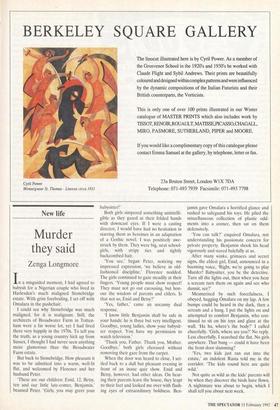New life
Murder they said
Zenga Longmore
In a misguided moment, I had agreed to babysit for a Nigerian couple who lived in Harlesden's much maligned Stonebridge estate. With grim foreboding, I set off with Omalara in the pushchair.
I could see why Stonebridge was much maligned, for it is malignant. Still, the architects of Broadwater Farm in Totten- ham were a far worse lot, yet I had lived there very happily in the 1970s. To tell you the truth, as a young country hick up from Sussex, I thought I had never seen anything more glamorous than the Broadwater Farm estate.
But back to Stonebridge. How pleasant it was to be admitted into a warm, well-lit flat, and welcomed by Florence and her husband Peter.
`These are our children: Enid, 12, Betsy, ten and our little late-corner, Benjamin,' beamed Peter. 'Girls, you may greet your babysitter!'
Both girls simpered something unintelli- gible as they gazed at their folded hands with downcast eyes. If I were a casting director, I would have had no hesitation in starring them as heroines in an adaptation of a Gothic novel. I was positively awe- struck by them. They were big, neat school- girls, with stripy ties and tightly backcombed hair.
`You see,' began Peter, noticing my impressed expression, `we believe in old- fashioned discipline.' Florence nodded. The girls continued to gaze steadily at their fingers. 'Young people must show respect! They must not go out carousing, but hon- our the wisdom of parents and elders. Is that not so, Enid and Betsy?'
`Yes, father,' came an uncanny dual response.
`I know little Benjamin shall be safe in your hands; he is three but very intelligent. Goodbye, young ladies, show your babysit- ter respect. You have my permission to watch television.'
`Thank you, Father. Thank you, Mother. Goodbye,' both girls chorused without removing their gaze from the carpet.
When the door was heard to close, I set- tled back to a dull but pleasant evening in front of an inane quiz show. Enid and Betsy, however, had other ideas. On hear- ing their parents leave the house, they leapt to their feet and looked me over with flash- ing eyes of extraordinary boldness. Ben-
jamin gave Omalara a horrified glance and rushed to safeguard his toys. He piled the miscellaneous collection of plastic odd- ments into a corner, then sat on them defensively.
`You can talk?' enquired Omalara, not understanding his passionate concern for private property. Benjamin shook his head vigorously and stared balefully at us.
After many winks, grimaces and secret signs, the eldest girl, Enid, announced in a booming voice, 'Right, we're going to play Murder! Babysitter, you be the detective. Turn all the lights out, then when you hear a scream turn them on again and see who dunnit, see?'
Mesmerised by such forcefulness, I obeyed, hugging Omalara on my lap. A few bumps could be heard in the dark, then a scream and a bang. I put the lights on and attempted to comfort Benjamin, who con- tinued to sit on his toys and glare at the wall. 'Ha ha, where's the body?' I called cheerfully. 'Girls, where are you?' No reply. Less cheerfully, I searched the flat. No girls anywhere. That bang — could it have been the front door slamming?
`Yes, two kids just ran out into the estate,' an indolent Rasta told me in the corridor. The kids round here are quite wild.'
Not quite as wild as the kids' parents will be when they discover the birds have flown. A nightmare was about to begin, which I shall tell you about next week.


























































 Previous page
Previous page